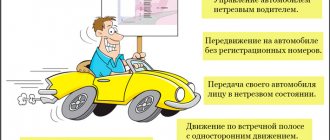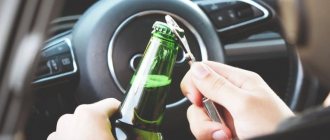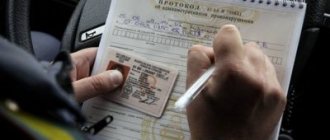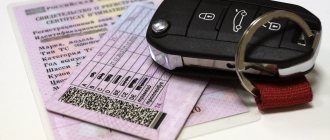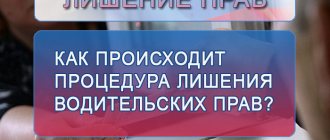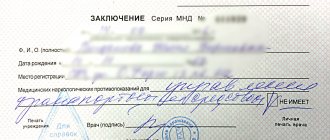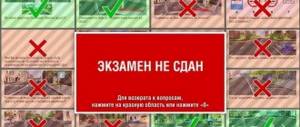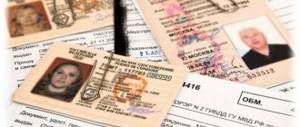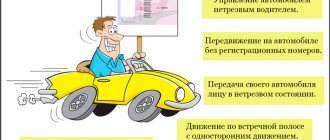Reduction of term of imprisonment, amnesty
Not all delinquent drivers can count on an amnesty after deprivation of their license for drunkenness.
According to current legislation, if at the time of the stop the traffic police officer determines that the motorist has a blood alcohol content less than or equal to 0.2 mg/l, one can hope to return the driving license under an amnesty.
This rule does not apply to cases where narcotic and psychotropic substances were found in the blood.
Another way to return your ID before the appointed time is to find errors in the inspector’s protocol.
Violations in the preparation of this document are considered:
- lack of witnesses;
- lack of a license from the institution that conducted the medical examination;
- retroactive entry of witnesses;
- no signatures or names.
Force majeure circumstances can also become an argument for early return of rights. This includes, for example, a situation where a driver takes medications with opiates as prescribed by a doctor.
At the same time, the offender himself was not informed by the specialist about the existing risks (he did not know about the content of these substances in the medications he was taking).
The considered cases, including amnesty for deprivation of rights, are practiced only under the following conditions:
- there are no other participants in the road accident, as well as injured pedestrians;
- Half of the period of deprivation of rights has passed;
- all fines to the traffic police and other debts (state duties, etc.) have been paid;
- The offender's exemplary behavior was noted.
The last point is quite controversial, since the concept of exemplary behavior is too vague, and there is no precise interpretation of it in the legislation.
To return your rights under the amnesty, you must submit a corresponding application to the traffic police, that is, appeal the decision on the administrative penalty. It must indicate the publication of the amnesty act. Here it would be a good idea to study the content of Article 31.7 of the Code of Administrative Offences, which establishes the conditions, procedures and other issues relating to the return of a driver’s license.
What documents are required?
In addition to the application, you will need to collect several documents and submit them to the traffic police department:
- passport;
- original court decision;
- certificate of completion of a medical examination;
- Statement of completion of the university;
- a document confirming successful completion of the traffic rules exam.
The driver must pass testing on the theoretical part of the rules of the road.
Since a unified database has now been implemented.
They may not issue a certificate, but simply enter the information into the computer.
All traffic police departments have access to this database.
What are the consequences if you do not surrender your license after deprivation?
If the driver agrees with the court order, within 3 days he must come with the certificate to the traffic police and hand it over. You should come to the unit closest to the place where the court that made the decision is located. It should be taken into account that if along with the basic license “in plastic” you also have a driver’s license, hand over that too.
Some drivers try to replace them using temporary documents. However, if in this case the traffic police representative stops the violator, the term assigned to him in court is subject to increase.
Officially, the ban period begins to apply from the date of transfer of driving documents to the traffic police, but if the received copy of the court order is not disputed.
As soon as the resolution comes into force, the former driver is temporarily (for the period of the sanction) forced to become a pedestrian.
Driving any type of transport during this period is punishable by a fine of 30 thousand rubles, arrest for 15 days, or compulsory work - 100-200 hours.
Is it possible to return rights early?
Driving while intoxicated is a serious offense, the severity of which increases if the driver’s actions cause an accident with victims. In such cases, you cannot count on early return of rights.
There are ways to return rights through an amnesty and other options discussed above, but they do not apply to persons who drove while drunk.
The only option for such drivers is to get the problem resolved through the courts. But here the services of a lawyer will be required, since the offender himself is unlikely to be able to defend himself.
You need to carefully prepare for the meeting.
A good chance may be the absence of a medical examination, since its results serve as the main argument.
Violations during the execution and preparation of a document will also be a good basis for protecting the driver in court:
- absence of signatures, names and witnesses themselves;
- using a breathalyzer in the absence of appropriate documentation;
- discrepancies in the data of the breathalyzer and the protocol;
- other violations.
Such errors can become the basis of evidence, and the driver will not be deprived of his license or will have it taken away for a minimum period. You can also challenge a court decision within 11 days after it comes into force.
Is it possible to get your license back early if you are deprived of your license for drunk driving?
The changes provided for the possibility of early return of a driver's license if any traffic violations were committed, including drunk driving. However, during the first reading this provision was excluded from the draft. Thus, drivers caught drinking alcohol while driving are not entitled to an early return of their driver’s license.
In addition to intoxication, there is another circumstance that cuts off the possibility of obtaining a license early after deprivation. This is a refusal to undergo a medical examination. A citizen who refuses to participate in this procedure, by default, admits the fact of his drunken state at the time of driving.
Consultation with a car lawyer in case of deprivation of rights
The help of a traffic lawyer can be a “lifeline” for a drunk driver.
Experts recommend adhering to the following simple rules when stopped by a traffic police officer at the moment.
When driving while intoxicated.
Tips to help reduce the risk of receiving the maximum punishment or avoid it altogether:
- remain calm when communicating with the inspector.
- refuse to voluntarily admit to drinking alcohol without conducting a test on a special device (breathalyzer) and a medical examination.
- refuse to draw up a report based on the words of a traffic police officer.
- make sure that the witnesses are really random people, and there are two of them.
- go to a medical facility for examination, accompanied by a police officer.
- check the accuracy of the charges contained in the text of the protocol and the circumstances of the arrest.
Of course, if you are heavily intoxicated, it is extremely difficult to follow these instructions.
The recommendations are only suitable for cases when we are talking about a small dose or drinking a small amount of alcohol the day before.
Procedure for deprivation of rights for driving a car while intoxicated
You can avoid deprivation of your driver's license if a traffic police officer violates the procedure for registering an offense.
Attention! Knowing the procedure for depriving your license for driving while intoxicated makes it possible to avoid losing your license:
- An employee of the state road safety inspection has the right to stop the driver at special checkpoints or under special conditions. For example, an interception plan is announced, and the car matches the description. Or the car was not moving according to the rules, which creates a threat to the lives of road users;
- The traffic police officer must demonstrate his desire to stop the vehicle. He must approach the side of the road in advance and indicate a special stop sign with a baton 50 meters from the vehicle. Sharp braking is not allowed, for example, if the driver is already level with the traffic police officer, and only at that moment he decided to stop the vehicle. In this case, the motorist has the right to drive past;
- If a police officer suspects a driver of using alcohol or drugs, he has the right to ask him to undergo a test. A breathalyzer is often used;
- The driver has no right to refuse to take a breathalyzer test. However, if the device does not reveal any violations, the traffic police officer issues a referral for a medical examination. The car owner has the right to refuse it. It must be said that the refusal often serves as evidence for the court of the offender’s guilt;
- if the driver refuses to undergo a medical examination and a breathalyzer test, then the decision to revoke a driver’s license is made only by the court;
- in any case, a protocol is drawn up, which records the breathalyzer readings or refusal to undergo the test;
- A traffic police officer is required to conduct a drunk driver for a medical examination. However, it is prohibited to force anyone to undergo it;
- the protocol is drawn up in the presence of two witnesses. Witnesses are disinterested citizens. Passers-by are attracted to them. Another law enforcement officer cannot become an attesting witness. If the protocol is drawn up without witnesses, as evidenced by the absence of a signature in the allotted line, the driver may request the suspension of the case due to a violation of the rules for recording an offense;
- After drawing up the protocol, the employee of the authorities sends it to the head within three days. Next, a special commission is created, which makes a decision on whether to accept the proceedings or to refuse. Within fifteen days, the driver can present his demands and show violations. This is the period given before the case is brought to court.
If the driver is sure that they are going to deprive him of his driver’s license illegally, without reason, he needs to act after the commission has adopted the protocol. If he proves that the procedure for recording the offense was carried out with errors, he can get the case suspended.
If the commission decides to refer the case to court, then it is almost impossible to influence its decision. Only by providing irrefutable evidence can the case be suspended.
ATTENTION! Look at the completed sample protocol on administrative violation:
How to increase your chances of getting your driver's license returned early?
As noted, due to the vagueness of the concept of exemplary behavior, it is difficult to meet this criterion.
But there are other factors that influence the outcome of the decision in favor of early return of the driver’s license:
- payment of all fines (if required, state duties and other payments);
- absence of offenses during the period of deprivation of rights;
- admission of guilt and complete repentance for illegal actions committed;
- compensation payments to citizens injured as a result of the accident (if there is an accident);
- positive characteristics from the place of work, place of registration, from the district police officer.
The decision to return the document is made only by the court, to which the driver deprived of his license must submit a petition. However, even with a positive verdict from the court, you will still have to pass the exam on the theoretical part of the traffic rules.
The procedure for returning rights after deprivation
You can begin the procedure for returning your rights after deprivation after half the sentence has expired.
Next you need to follow the instructions:
- pass an exam on traffic rules. This is a test on a computer, including 20 questions on the theoretical part. Topics: psychology of transport management, first aid to victims, administrative responsibility for violating traffic rules. If you fail the exam, you can try again in a week;
- medical commission. You can take place in any medical institution (including private clinics with a license for such activities). Doctors must sign their names: narcologist, psychiatrist, otolaryngologist, ophthalmologist, neurologist, surgeon, therapist;
- submission of documents. At the nearest traffic police office, you need to submit an application for restoration of your driver’s license (return) and submit a package of documents (the list is indicated above).
The procedure for returning rights is quite simple and fast. You can receive the document on the day of application or the next business day.
List of documents for restoration of rights after deprivation of rights for drunkenness
The list of documents for returning rights after deprivation is always approximately the same:
- ID card (preferably a passport of a citizen of the Russian Federation);
- an application for the return of rights, filled out according to a standard sample (it can be obtained from the traffic police department);
- a document confirming your registration (a registration mark in your passport will be sufficient);
- a copy of the court decision on the withdrawal of rights;
- certificate of transfer of rights to the traffic police archive itself;
- receipt of payment of state duty;
- notification of successful completion of the exam or medical certificate.
Sometimes other documents may be required, but this is not a problem. The traffic police officer will immediately tell you what papers are missing, and the person has enough time to collect them and bring them to the department.
We invite you to read: What happens if your license expires?
It should be noted right away that the new legislation does not allow for a situation in which traffic police inspectors took away your license on the spot. Representatives of the law can only examine the driver’s intoxication and record the situation. Rights are deprived solely on the basis of a court decision. Until the meeting, the documents remain in the hands of the offender. After the relevant decision is issued, he will have to surrender his license within 3 days.
In addition, it is in the interests of the offender himself to voluntarily surrender a temporary driving permit, if he has one, of course, along with his permanent license. No, no one has the right to forcibly take away your documents, but you will punish yourself by keeping them. The fact is that the countdown period for the penalty in the form of deprivation of rights will begin only from the moment the documents are accepted by the inspector (necessarily upon receipt).
So, the list of articles of the Code of Administrative Offenses of the Russian Federation, which you should refer to to deprive your rights for drunkenness:
- In part one of Art. 12.8 of the Code of Administrative Offenses of the Russian Federation states that for driving while intoxicated, the violator faces a fine and deprivation of rights for 1.5-2 years. Such administrative penalties can be dispensed with if the driver’s actions did not bear any signs of a criminal offense. To regulate the issue, you need to refer to the articles of Federal Law No. 528 of December 31, 2014.
- Part two of Article 12.8 of the Code of Administrative Offenses of the Russian Federation states that transferring control of transport to a person who is intoxicated entails an administrative fine along with deprivation of rights for 1.5-2 years.
- Part one of Article 12.26 of the Code of Administrative Offenses of the Russian Federation indicates that if a violator refuses a medical examination at the request of an inspector, it entails a fine and deprivation of rights. Again, this is provided that the violation does not bear any signs of a criminal offense (Federal Law No. 528-FZ, as amended on December 31, 2014).
The fine for all these violations is 30,000 rubles. Thus, the violator will be punished for the above amount and a restriction on driving a vehicle for a period of 1.5-2 years. But the question of whether it is possible to return the rights before the trial for drunkenness should not arise at all, since no one will take them away from the offender before the hearing. If the violator is deprived of his rights, it is only by court decision.
To get your driver’s license back after being revoked for drunkenness, you will need to provide the following list of documents to the traffic police department.
- identification card (both a passport and a document replacing it in accordance with the legislation of the Russian Federation);
- a copy of the court order on deprivation of a driver's license;
- a certificate confirming that the driver's license was tested after being disqualified for drunkenness;
- medical certificate allowing the driver to drive a car.
In order to resolve the case pre-trial, you should pay attention to the violations and errors that often accompany the registration of the incident. The inspector draws up a protocol and enters fact-establishing information into it. The driver’s objections related to the merits of the case may be included in the legal act. Three days later, the completed protocol is reviewed by the traffic police and a decision is made to send the person to court. The law allocates 15 days for this procedure; in the absence of procedural violations, the case is sent to the magistrate’s court at the defendant’s place of residence.
You can challenge the documents submitted to the court by claiming that medical and traffic reports were drawn up in bad faith.
Attention should be paid to compliance with the regulations, including:
- the presence of two witnesses when drawing up a protocol on the violation;
- mandatory presence of witnesses when sent to a hospital to determine the amount of alcohol in the blood;
- a copy of the protocol and the inspection report is handed over to the perpetrator against signature;
- during a mobile examination, written breathalyzer readings are given to the driver;
- the driver has the right to check the documents of the measuring device, the date of the last verification;
- the violator has the right to fill out a special column about objections or note their absence.
If a citizen has made his comments and expressed written disagreement, he is summoned to the traffic police commission within the time limit established for consideration. The citizen has the right to compare his copy and the one presented by the inspectors. Discrepancies, amendments and inconsistencies are a compelling reason to cancel the judicial review and an option for how to return your license early for drunkenness.
Obvious inconsistencies and errors, failure to comply with mandatory filling standards will lead to official penalties for the inspector. Complex and controversial incidents will require the officer to be called to a commission, where the opposing parties will present their vision of the situation. If your license was taken away for drunkenness, an auto lawyer can explain how to get it back in a short time, having examined the specific situation.
